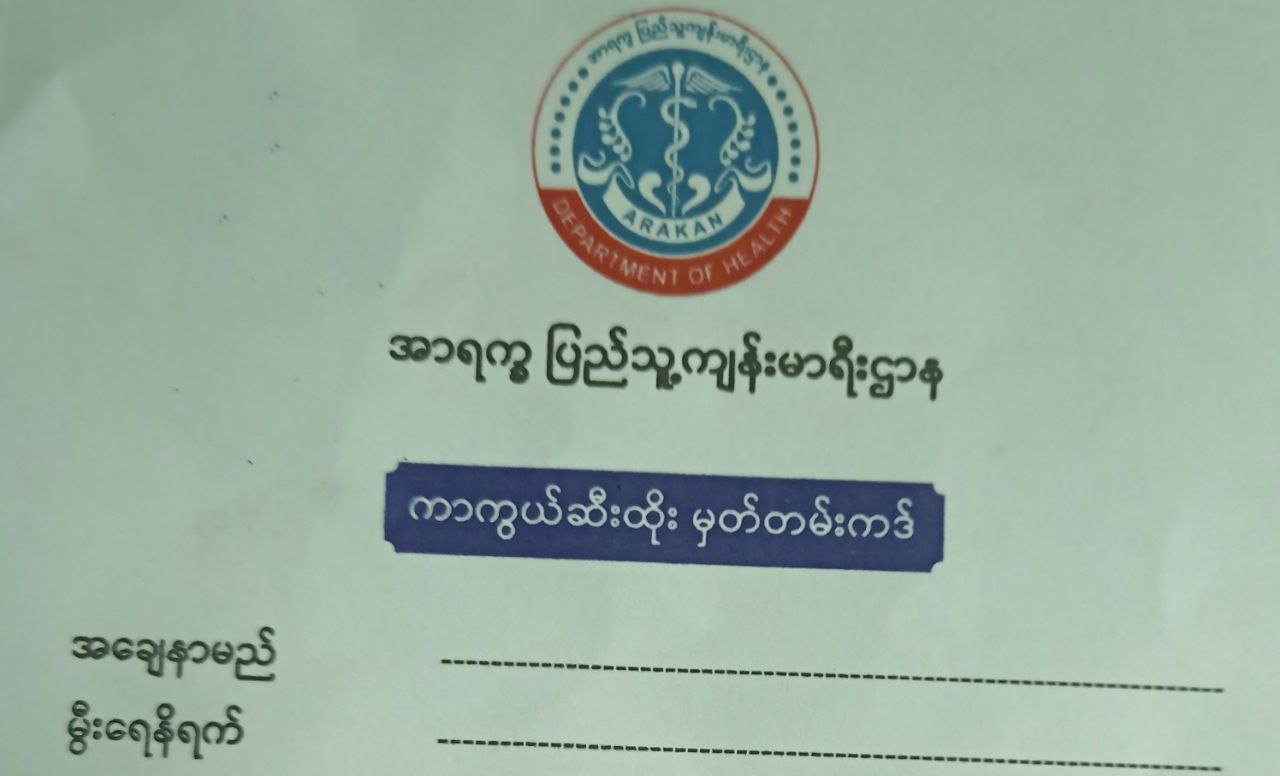Border News Agency
Ponnakyun, May 28
Pregnant women and young children in townships controlled by the Arakan Army (AA) are in urgent need of vaccinations, according to displaced people and local residents in Arakan.
Since the beginning of the all-out war in Arakan, the Myanmar junta has blocked all forms of transportation, including road and water routes, across the entire region. As a result, medicine prices have skyrocketed, and many pregnant women and children have not received a single dose of vaccines, locals said.
“I’m now in the final stage of my pregnancy. Since the beginning, I haven’t received a single dose of vaccination. I’m worried for both myself and my unborn baby because of the lack of protection. Especially now, with various diseases spreading,” a pregnant woman who is a war refugee from Ponakyun Township told Border News Agency.
In the Arakan region, free nationwide vaccinations supported by UNICEF were previously provided to pregnant women and children under the age of two. However, local residents say that access to these vaccinations has been lost for over a year now.
Normally, pregnant women are supposed to receive two doses of the tetanus vaccine at hospitals or clinics – starting from the early stages of pregnancy. These vaccinations are essential not only for the health of the mother and child but also to protect against infectious diseases that may occur during or after childbirth.
Infants under the age of two are normally given vaccinations to protect against diseases such as tuberculosis (TB) and hepatitis B at birth. Between the ages of two to six months, they are supposed to receive additional vaccines for hepatitis B (booster dose), whooping cough, diphtheria, tetanus, polio, and rotavirus, among others.
Children between the ages of 9 to 12 months, as well as those between 1 and 2 years old, are normally scheduled to receive routine vaccinations against diseases such as measles, mumps, rubella (German measles), encephalitis, and diphtheria.
Due to the lack of access to these essential vaccines, many pregnant women are experiencing growing anxiety and concern. Displaced persons and residents in Arakan say they are increasingly worried about the future health and well-being of their young children.
“I’m really worried for my child because we haven’t been able to get the regular vaccinations. I’m also concerned about long-term health issues. No health department is coming to give any vaccines, and we don’t know what to do,” a mother from the Arakan region told Border News Agency.
In addition to the lack of vaccinations, displaced pregnant women and civilians are also facing medicine shortages and financial hardship, making it impossible for them to afford even basic supplements like iron tablets commonly taken during pregnancy, they said.
Some people who can afford it have tried to get vaccinated by visiting hospitals and clinics. However, due to ongoing fighting in the Arakan region, many of these medical facilities are closed. In addition to the closures, residents are also facing difficulties purchasing medicine, with prices skyrocketing to unaffordable levels, locals said.
According to health department guidelines, pregnant women and children under the age of two are supposed to receive routine vaccinations and supplements on a scheduled timeline. These include vaccines for hepatitis (jaundice), polio, whooping cough, diphtheria, encephalitis, measles, tetanus, severe pneumonia, diarrhea, and Japanese encephalitis. Regular administration of these vaccines and oral supplements is critical for their health and development.
However, pregnant women and young children in the Arakan region have been deprived of access to these routine and scheduled vaccinations and supplements for over a year, according to local residents.
“Many pregnant women haven’t received any vaccinations. They’re giving birth without any protection, and their babies haven’t received even a single dose of vaccine for over a year. The lack of vaccinations could lead to serious long-term health consequences. For children, it could mean stunted development, hearing loss, or other disabilities. Medicines are impossible to find. Vaccines aren’t reaching Rakhine. And even if they do, only those who can afford them get access. As a healthcare worker, I feel helpless – there’s no medicine available, and nothing we can do,” a midwife in the region told Border News Agency.
Additionally, locals say that the Myanmar junta has been conducting airstrikes on hospitals and clinics in the Arakan region, causing pregnant women to live in fear and anxiety about giving birth safely.
Although the Bangladesh government and international organizations have provided some vaccines, which have been delivered across the border through areas like Taungpyolakway, the quantities are very limited. As a result, many pregnant women and children under two years old in Arakan have still not received the necessary vaccinations, residents say.
In the all-out Arakan war, the Arakan Army (AA) has fully captured 15 townships, including the Paletwa area, and established the Arakan People’s Revolutionary Government to administer these regions.
Within this government, the Arakan People’s Health Department has been formed to provide healthcare services to the local population. However, due to shortages of essential supplies including medicines – residents say they still do not receive adequate healthcare services.
Despite limited access to medicines and supplies through border areas including the Arakan-Bangladesh and Arakan-India borders, as well as regions like Chin, Magway, Bago, and Ayeyarwady, the people of Arakan say they still have not been able to obtain all the necessary items, including essential vaccines.






